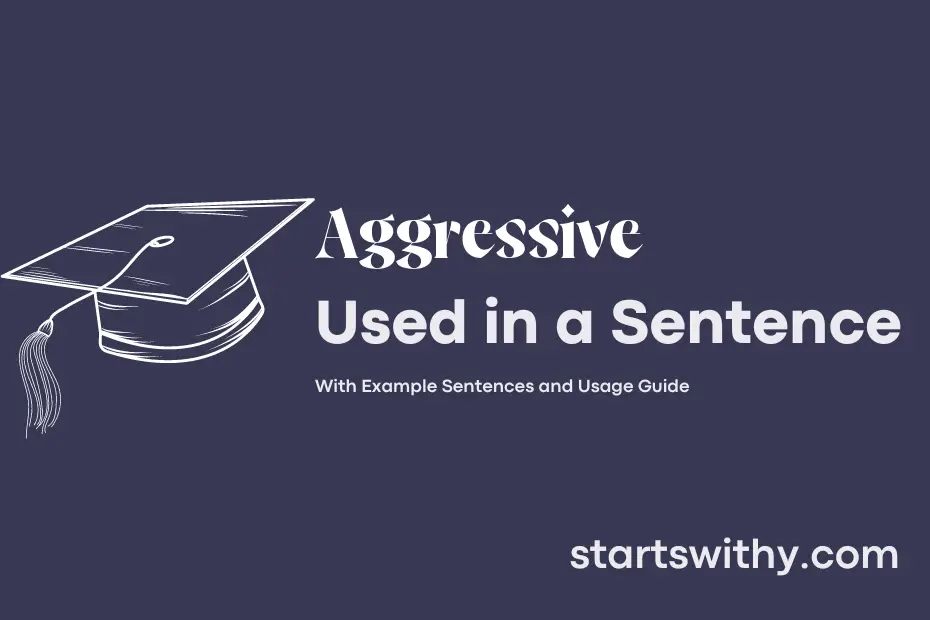Do you want to learn how to properly use the word “aggressive” in a sentence? In the English language, the term “aggressive” is often used to describe behavior that is forceful, assertive, or hostile in nature.
When constructing a sentence with “aggressive,” it is important to consider the context in which the word is being used to ensure clarity and precision in communication. By understanding how to effectively integrate “aggressive” into your sentences, you can convey your message with impact and accuracy.
7 Examples Of Aggressive Used In a Sentence For Kids
- The tiger looked very aggressive.
- The wrestler had an aggressive stance.
- The lion roared aggressively.
- The dinosaur in the movie was aggressive.
- The bully acted aggressively towards others.
- The storm clouds looked aggressive.
- The dog barked aggressively at strangers.

14 Sentences with Aggressive Examples
- Aggressive behavior towards classmates is not acceptable in a college setting.
- It is important to address aggressive professors in a respectful manner.
- Group projects can sometimes lead to aggressive debates among students.
- Learning how to deal with aggressive feedback is a key skill for college success.
- Campus sports teams often exhibit aggressive tactics during matches.
- Exam season can bring out aggressive behavior in students due to stress.
- It is important to seek help if you feel overwhelmed by aggressive academic workload.
- Joining a debate club can help students channel their aggressive energy in a positive way.
- Student elections can sometimes involve aggressive campaigning strategies.
- Balancing social life and academics can sometimes lead to aggressive behavior towards roommates.
- It is important to set boundaries with aggressive colleagues in a college environment.
- Aggressive networking can help students secure internships and job opportunities.
- Mental health workshops are essential to address aggressive behavior among students.
- Dealing with aggressive roommates can be challenging, but open communication is key.

How To Use Aggressive in Sentences?
Aggressive is an adjective used to describe behaviors or actions that are forceful, assertive, or intense.
When using Aggressive in a sentence, it is important to provide context to clearly convey the intended meaning. For example, “The dog displayed aggressive behavior towards strangers” indicates that the dog acted in a hostile or threatening manner.
To use Aggressive effectively in a sentence, consider the following tips:
- Choose the appropriate context: Make sure the situation warrants the use of the word Aggressive. It is commonly used to describe behaviors, actions, or attitudes.
- Provide examples: When using Aggressive, it can be helpful to provide specific examples to illustrate the behavior or action being described.
- Use modifiers: To add depth to your description, consider using adverbs or adjectives that further clarify the level or type of Aggressive behavior. For instance, “The player made an extremely aggressive move” emphasizes the intensity of the action.
- Be mindful of tone: Depending on the context, using the word Aggressive can convey negative connotations. Be mindful of how it may be interpreted by your audience.
By following these tips, you can effectively incorporate Aggressive into your writing to clearly communicate intense or forceful behaviors or actions.

Conclusion
In conclusion, the use of aggressive language in sentences can evoke strong emotions and convey a forceful tone. It is important to be mindful of how and when such language is used to ensure effective communication. Aggressive sentences can be used to assert dominance, express frustration, or provoke a reaction, but they should be used sparingly and with consideration for their impact on the recipient.
By balancing assertiveness with sensitivity, individuals can navigate conversations more effectively and avoid escalation or misunderstandings. It is crucial to approach communication with respect and empathy, keeping in mind the power of language to shape interactions and relationships. Awareness of the impact of aggressive sentences can lead to more constructive dialogues and foster better connections with others.



